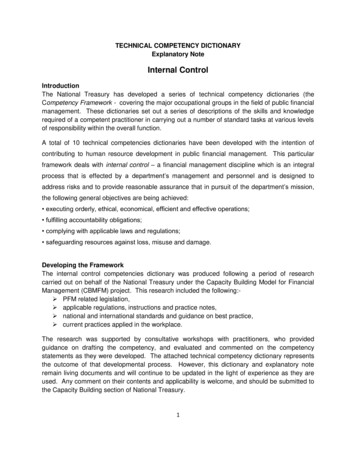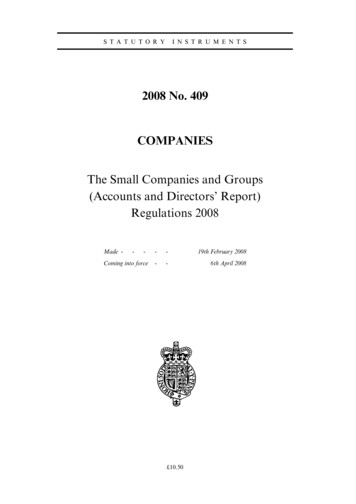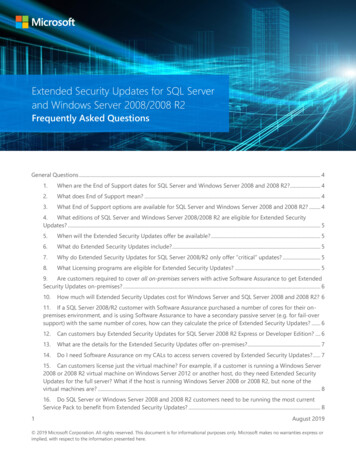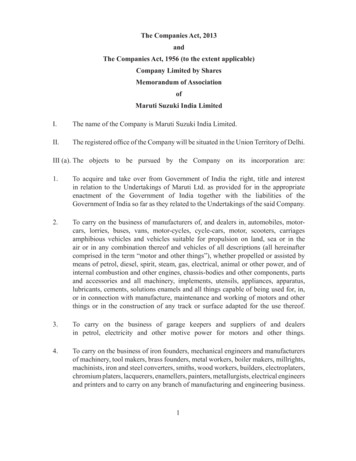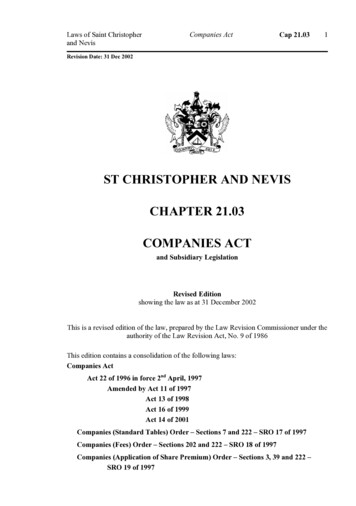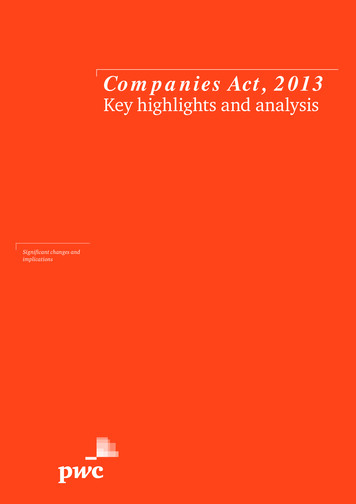
Transcription
COMPANIES ACT 71 OF 2008(English text signed by the President)[Assented To: 8 April 2009][Commencement Date: to be proclaimed]as amended by:Companies Amendment Act 3 of 2011ACTTo provide for the incorporation, registration, organisation and management ofcompanies, the capitalisation of profit companies, and the registration of offices offoreign companies carrying on business within the Republic; to define the relationshipsbetween companies and their respective shareholders or members and directors; toprovide for equitable and efficient amalgamations, mergers and takeovers ofcompanies; to provide for efficient rescue of financially distressed companies; toprovide appropriate legal redress for investors and third parties with respect tocompanies; to establish a Companies and Intellectual Property Commission and aTakeover Regulation Panel to administer the requirements of the Act with respect tocompanies, to establish a Companies Tribunal to facilitate alternative dispute resolutionand to review decisions of the Commission; to establish a Financial ReportingStandards Council to advise on requirements for financial record-keeping andreporting by companies; to repeal the Companies Act, 1973 (Act No. 61 of 1973), andmake amendments to the Close Corporations Act, 1984 (Act No. 69 of 1984), asnecessary to provide for a consistent and harmonious regime of business incorporationand regulation; and to provide for matters connected therewith.BE IT ENACTED by the Parliament of the Republic of South Africa, as follows:ARRANGEMENT OF SECTIONSCHAPTER 1INTERPRETATION, PURPOSE AND APPLICATIONPart AInterpretation1.2.3.4.5.6.DefinitionsRelated and inter-related persons, and controlSubsidiary relationshipsSolvency and liquidity testGeneral interpretation of ActAnti-avoidance, exemptions and substantial compliancePart BPurpose and application
7.8.9.10.Purposes of ActCategories of companiesModified application with respect to state-owned companiesModified application with respect to non-profit companiesCHAPTER 2FORMATION, ADMINISTRATION AND DISSOLUTION OF COMPANIESPart AReservation and registration of company names11.12.Criteria for names of companiesReservation of name for later usePart BIncorporation and legal status of companies13.14.15.16.17.18.19.20.21.22.Right to incorporate company or transfer registration of foreign companyRegistration of companyMemorandum of Incorporation, shareholder agreements and rules of companyAmending Memorandum of IncorporationAlterations, translations and consolidations of Memorandum of IncorporationAuthenticity of versions of Memorandum of IncorporationLegal status of companiesValidity of company actionsPre-incorporation contractsReckless trading prohibitedPart CTransparency, accountability and integrity of nal companies and registered officeForm and standards for company recordsLocation of company recordsAccess to company recordsFinancial year of companyAccounting recordsFinancial statementsAnnual financial statementsAccess to financial statements or related informationUse of company name and registration numberAnnual returnAdditional accountability requirements for certain companiesPart DCapitalisation of profit companies35.Legal nature of company shares and requirement to have shareholders
on for sharesPreferences, rights, limitations and other share termsIssuing sharesPre-emptive right to be offered and to subscribe sharesConsideration for sharesShareholder approval for issuing shares in certain casesOptions for subscription of securitiesSecurities other than sharesFinancial assistance for subscription of securitiesLoans or other financial assistance to directorsDistributions must be authorised by boardCapitalisation sharesCompany or subsidiary acquiring company‟s sharesPart ESecurities registration and transfer49.50.51.52.53.54.55.56.Securities to be evidenced by certificates or uncertificatedSecurities register and numberingRegistration and transfer of certificated securitiesRegistration of uncertificated securitiesTransfer of uncertificated securitiesSubstitution of certificated or uncertificated securitiesLiability relating to uncertificated securitiesBeneficial interest in securitiesPart FGovernance of .71.72.73.74.75.76.Interpretation and application of PartShareholder right to be represented by proxyRecord date for determining shareholder rightsShareholders acting other than at meetingShareholders meetingsNotice of meetingsConduct of meetingsMeeting quorum and adjournmentShareholder resolutionsBoard, directors and prescribed officersFirst director or directorsElection of directors of profit companiesIneligibility and disqualification of persons to be director or prescribed officerVacancies on boardRemoval of directorsBoard committeesBoard meetingsDirectors acting other than at meetingDirector‟s personal financial interestsStandards of directors‟ conduct
77.78.Liability of directors and prescribed officersIndemnification and directors‟ insurancePart GWinding-up of solvent companies and deregistering companies79.80.81.82.83.Winding-up of solvent companiesVoluntary winding-up of solvent companyWinding-up of solvent companies by court orderDissolution of companies and removal from registerEffect of removal of company from registerCHAPTER 3ENHANCED ACCOUNTABILITY AND TRANSPARENCYPart AApplication and general requirements of Chapter84.85.Application of ChapterRegistration of secretaries and auditorsPart BCompany secretary86.Mandatory appointment of company secretary87.88.89.Juristic person or partnership may be appointed company secretaryDuties of company secretaryResignation or removal of company secretaryPart CAuditors90.91.92.93.Appointment of auditorResignation of auditors and vacanciesRotation of auditorsRights and restricted functions of auditorsPart DAudit committees94.Audit committeesCHAPTER 4PUBLIC OFFERINGS OF COMPANY SECURITIES95.96.97.Application and interpretation of ChapterOffers that are not offers to publicStandards for qualifying employee share schemes
111.Advertisements relating to offersGeneral restrictions on offers to publicRequirements concerning prospectusSecondary offers to publicConsent to use of name in prospectusVariation of agreement mentioned in prospectusLiability for untrue statements in prospectusLiability of experts and othersResponsibility for untrue statements in prospectusTime limit as to allotment or acceptanceRestrictions on allotmentVoidable allotmentMinimum interval before allotment or acceptanceConditional allotment if prospectus states securities to be listedCHAPTER 5FUNDAMENTAL TRANSACTIONS, TAKEOVERS AND OFFERSPart AApproval for certain fundamental transactions112.Proposals to dispose of all or greater part of assets or undertaking113.114.115.116.Proposals for amalgamation or mergerProposals for scheme of arrangementRequired approval for transactions contemplated in PartImplementation of amalgamation or mergerPart BAuthority of Panel and Takeover Regulations117.118.119.120.Definitions applicable to this Part, Part C and Takeover RegulationsApplication of this Part, Part C and Takeover RegulationsPanel regulation of affected transactionsTakeover RegulationsPart CRegulation of affected transactions and offers121.122.123.124.125.126.127.General requirement concerning transactions and offersRequired disclosure concerning certain share transactionsMandatory offersCompulsory acquisitions and squeeze-outComparable and partial offersRestrictions on frustrating actionProhibited dealings before and during an offerCHAPTER 6BUSINESS RESCUE AND COMPROMISE WITH CREDITORS
Part ABusiness rescue .Application and definitions applicable only to ChapterCompany resolution to begin business rescue proceedingsObjections to company resolutionCourt order to begin business rescue proceedingsDuration of business rescue proceedingsGeneral moratorium on legal proceedings against companyProtection of property interestsPost-commencement financeEffect of business rescue on employees and contractsEffect on shareholders and directorsPart BPractitioner’s functions and terms of appointment138.Qualifications of practitioners139.140.141.142.143.Removal and replacement of practitionerGeneral powers and duties of practitionerInvestigation of affairs of companyDirectors of company to co-operate with and assist practitionerRemuneration of practitionerPart CRights of affected persons during business rescue proceedings144.145.146.147.148.149.Rights of employeesParticipation by creditorsParticipation by holders of company‟s securitiesFirst meeting of creditorsFirst meeting of employees‟ representativesFunctions, duties and membership of committees of affected personsPart DDevelopment and approval of business rescue plan150.Proposal of business rescue plan151.152.153.154.Meeting to determine future of companyConsideration of business rescue planFailure to adopt business rescue planDischarge of debts and claimsPart ECompromise with creditors155.Compromise between company and creditors
CHAPTER 7REMEDIES AND ENFORCEMENTPart AGeneral principles156.157.158.159.Alternative procedures for addressing complaints or securing rightsExtended standing to apply for remediesRemedies to promote purpose of ActProtection for whistle-blowersPart BRights to seek specific remedies160.Disputes concerning reservation or registration of company names161. Application to protect rights of securities holders162. Application to declare director delinquent or under probation163. Relief from oppressive or prejudicial conduct or from abuse of separate juristicpersonality of company164. Dissenting shareholders‟ appraisal rights165. Derivative actionsPart CVoluntary resolution of disputes166.Alternative dispute resolution167.Dispute resolution may result in consent orderPart DComplaints to Commission or Panel168.Initiating complaint169.170.171.172.173.174.175.Investigation by Commission or PanelOutcome of investigationIssuance of compliance noticesObjection to noticesConsent ordersReferral of complaints to courtAdministrative finesPart EPowers to support investigations and inspections176.177.178.179.SummonsAuthority to enter and search under warrantPowers to enter and searchConduct of entry and search
Part FCompanies Tribunal adjudication procedures180.Adjudication hearings before Tribunal181.182.183.184.Right to participate in hearingPowers of Tribunal adjudication hearingRules of procedureWitnessesCHAPTER 8REGULATORY AGENCIES AND ADMINISTRATION OF ACTPart ACompanies and Intellectual Property Commission185.Establishment of Companies and Intellectual Property Commission186.187.188.189.190.191.192.Commission objectivesFunctions of CommissionReporting, research, public information and relations with other regulatorsAppointment of CommissionerMinister may direct policy and require investigationEstablishment of specialist committeesConstitution of specialist committeesPart BCompanies Tribunal193194.195.Establishment of Companies TribunalAppointment of Companies TribunalFunctions of Companies TribunalPart CTakeover Regulation Panel196.197.198.199.200.201.202.Establishment of Takeover Regulation PanelComposition of PanelChairperson and deputy chairpersonsMeetings of PanelExecutive of PanelFunctions of PanelTakeover Special CommitteePart DFinancial Reporting Standards Council203.204.Establishment and composition of CouncilFunctions of Council
Part EAdministrative provisions applicable to Agencies205.Qualifications for membership206.207.208.209.210.211.212.Conflicting interests of agency membersResignation, removal from office and vacanciesConflicting interests of employeesAppointment of inspectors and investigatorsFinancesReviews and reports to MinisterConfidential informationCHAPTER 9OFFENCES, MISCELLANEOUS MATTERS AND GENERAL PROVISIONSPart AOffences and penalties213.214.215.216.217.Breach of confidenceFalse statements, reckless conduct and non-complianceHindering administration of ActPenaltiesMagistrate‟s Court jurisdiction to impose penaltiesPart BMiscellaneous matters218.219.220.221.222.Civil actionsLimited time for initiating complaintsServing documentsProof of factsState liabilityPart CRegulations, consequential matters and commencement223.224.225.RegulationsConsequential amendments, repeal of laws and transitional arrangementsShort title and commencementSCHEDULE 1PROVISIONS CONCERNING NON-PROFIT COMPANIES1.Objects and policies2.3.4.Fundamental transactionsIncorporators of non-profit companyMembers
5.DirectorsSCHEDULE 2CONVERSION OF CLOSE CORPORATIONS TO COMPANIES1.2.Notice of conversion of close corporationEffect of conversion on legal statusSCHEDULE 3AMENDMENT OF LAWSA:1.2.3.4.5.6.7.8.B:Close Corporations Act, 1984Amendments to Close Corporations Act definitionsLimitation of period to incorporate close corporations or convert companiesLegal status of close corporationsNames of corporationsTransparency and accountability of close corporationsRescue of financially distressed close corporationsDissolution of corporationsDeregistration of corporationsConsequential amendments to certain other Acts listed in Schedule 4SCHEDULE 4LEGISLATION TO BE ENFORCED BY COMMISSIONSCHEDULE 5TRANSITIONAL pretationContinuation of pre-existing companiesPending mattersMemorandum of Incorporation and rulesPre-incorporation contractsPar value of shares, treasury shares, capital accounts and share certificatesCompany finance and governanceCompany names and name reservationsContinued application of previous Act to winding-up and liquidationPreservation and continuation of court proceedings and ordersGeneral preservation of regulations, rights, duties, notices and other instrumentsTransition of regulatory agenciesContinued investigation and enforcement of previous ActRegulationsCHAPTER 1INTERPRETATION, PURPOSE AND APPLICATIONPart A
Interpretation1.DefinitionsIn this Act, unless the context indicates otherwise“accounting records” means information in written or electronic form concerning thefinancial affairs of a company as required in terms of this Act, including but not limitedto, purchase and sales records, general and subsidiary ledgers and other documents andbooks used in the preparation of financial statements;[Definition of “accounting records” inserted by s. 1 of Act 3/2011]“acquiring party”, when used in respect of a transaction or proposed transaction,means a person who, as a result of the transaction, would directly or indirectly acquireor establish direct or indirect control or increased control over all or the greater part of acompany, or all or the greater part of the assets or undertaking of a company;[Definition of “acquiring party” inserted by s. 1 of Act 3/2011]“advertisement” means any direct or indirect communication transmitted by anymedium, or any representation or reference written, inscribed, recorded, encoded uponor embedded within any medium, by means of which a person seeks to bring anyinformation to the attention of all or part of the public;“agreement” includes a contract, or an arrangement or understanding between oramong two or more parties that purports to create rights and obligations between oramong those parties;“all or the greater part of the assets or undertaking”, when used in respect of acompany, means (a)in the case of the company‟s assets, more than 50% of its gross 40 assets fairlyvalued, irrespective of its liabilities; or(b)in the case of the company‟s undertaking, more than 50% of the value of its entireundertaking, fairly valued;[Definition of “all or the greater part of the assets or undertaking” inserted by s. 1 of Act 3/2011]“alterable provision” means a provision of this Act in which it is expresslycontemplated that its effect on a particular company may be negated, restricted, limited,qualified, extended or otherwise altered in substance or effect by that company‟sMemorandum of Incorporation;“alternate director” means a person elected or appointed to serve, as the occasionrequires, as a member of the board of a company in substitution for a particular electedor appointed director of that company;“amalgamation or merger” means a transaction, or series of transactions, pursuant toan agreement between two or more companies, resulting in-
(a)the formation of one or more new companies, which together hold all of theassets and liabilities that were held by any of the amalgamating or mergingcompanies immediately before the implementation of the agreement, and thedissolution of each of the amalgamating or merging companies; or(b)the survival of at least one of the amalgamating or merging companies, with orwithout the formation of one or more new companies, and the vesting in thesurviving company or companies, together with any such new company orcompanies, of all of the assets and liabilities that were held by any of theamalgamating or merging companies immediately before the implementation ofthe agreement;[Para. (b) substituted by s. 1 of Act 3/2011]“amalgamated or merged company” means a company that either(a)was incorporated pursuant to an amalgamation or merger agreement; or(b)was an amalgamating or merging company and continued in existence after theimplementation of the amalgamation or merger agreement,and holds any part of the assets and liabilities that were held by any of theamalgamating or merging companies immediately before the implementation of theagreement;“amalgamating or merging company” means a company that is a party to anamalgamation or merger agreement;“annual general meeting” means the meeting of a public company required by section61(7);“audit” has the meaning set out in the Auditing Profession Act, but does not include an“independent review” of annual financial statements, as contemplated in section30(2)(b)(ii)(bb);[Definition of “audit” substituted by s. 1 of Act 3/2011]“Auditing Profession Act” means the Auditing Profession Act, 2005 (Act No. 26 of2005);“auditor” has the meaning set out in the Auditing Act;[Definition of “auditor” substituted by s. 1 of Act 3/2011]“Banks Act” means the Banks Act, 1990 (Act No. 94 of 1990);[Definition of “Banks Act” substituted by s. 1 of Act 3/2011]“beneficial interest”, when used in relation to a company‟s securities, means the rightor entitlement of a person, through ownership, agreement, relationship or otherwise,alone or together with another person to(a)receive or participate in any distribution in respect of the company‟s securities;
(b)exercise or cause to be exercised, in the ordinary course, any or all of the rightsattaching to the company‟s securities; or(c)dispose or direct the disposition of the company‟s securities, or any part of adistribution in respect of the securities,but does not include any interest held by a person in a unit trust or collective investmentscheme in terms of the Collective Investment Schemes Act, 2002 (Act No. 45 of 2002);“board” means the board of directors of a company;“business days” has the meaning determined in accordance with section 5(3);“Cabinet” means the body of the national executive described in section 91 of theConstitution;“central securities depository” has the meaning set out in section 1 of the SecuritiesServices Act, 2004 (Act No. 36 of 2004);“close corporation” means a juristic person incorporated under the Close CorporationsAct, 1984 (Act No. 69 of 1984);“Commission” means the Companies and Intellectual Property Commissionestablished by section 185;“Commissioner” means the person appointed to or acting in the office of that name, ascontemplated in section 189;“Companies Tribunal” means the Companies Tribunal established in terms of section193;“companies register” means the register required to be established by the Commissionin terms of section 187(4);“company” means a juristic person incorporated in terms of this Act, a domesticatedcompany, or a juristic person that, immediately before the effective date[Words preceding para. (a) substituted by s. of Act 3/2011](a)(b)was registered in terms of the(i)Companies Act, 1973 (Act No. 61 of 1973), other than as an externalcompany as defined in that Act; or(ii)Close Corporations Act, 1984 (Act No. 69 of 1984), if it has subsequentlybeen converted in terms of Schedule 2;was in existence and recognised as an „existing company‟ in terms of theCompanies Act, 1973 (Act No. 61 of 1973); or
(c)was deregistered in terms of the Companies Act, 1973 (Act No. 61 of 1973), andhas subsequently been re-registered in terms of this Act;“Competition Act”, means the Competition Act, 1998 (Act No. 89 of 1998);“consideration” means anything of value given and accepted in exchange for anyproperty, service, act, omission or forbearance or any other thing of value, including(a)any money, property, negotiable instrument, securities, investment credit facility,token or ticket;(b)any labour, barter or similar exchange of one thing for another; or(c)any other thing, undertaking, promise, agreement or assurance, irrespective of itsapparent or intrinsic value, or whether it is transferred directly or indirectly;“Constitution” means the Constitution of the Republic South Africa, 1996;“convertible securities” .[Definition of “convertible securities” substituted by the definition of “convertible” by s. 1 of Act 3/2011]“convertible”, when used in relation to any securities of a company, means securitiesthat may, by their terms, be converted into other securities of the company, including (a)(b)any non-voting securities issued by the company and which will become votingsecurities(i)on the happening of a designated event; or(ii)if the holder of those securities so elects at some time after acquiring them;andoptions to acquire securities to be issued by the company, irrespective of whetherthose securities may be voting securities, or non-voting securities contemplated inparagraph (a);[Definition of “convertible” inserted by s. 1 of Act 3/2011 to substitute the definition of “convertible securities“]“co-operative” means a juristic person as defined in the Co-operatives Act, 2005 (ActNo. 14 of 2005);“Council” means the Financial Reporting Standards Council established by section203;“director” means a member of the board of a company, as contemplated in section 66,or an alternate director of a company and includes any person occupying the position ofa director or alternate director, by whatever name designated;“distribution” means a direct or indirect-
(a)transfer by a company of money or other property of the company, other than itsown shares, to or for the benefit of one or more holders of any of the shares, or tothe holder of a beneficial interest in any such shares, of that company or ofanother company within the same group of companies, whether[Words preceding subpara. (1) substituted by s. 1 of Act 3/2011](i)in the form of a dividend;(ii)as a payment in lieu of a capitalisation share, as contemplated in section 47;(iii) as consideration for the acquisition[Words preceding item (aa) substituted by s. 1 of Act 3/2011](aa) by the company of any of its shares, as contemplated in section 48; or(bb) by any company within the same group of companies, of any sharesof a company within that group of companies; or(iv) otherwise in respect of any of the shares of that company or of anothercompany within the same group of companies, subject to section 164(19);(b)incurrence of a debt or other obligation by a company for the benefit of one ormore holders of any of the shares of that company or of another company withinthe same group of companies; or(c)forgiveness or waiver by a company of a debt or other obligation owed to thecompany by one or more holders of any of the shares of that company or ofanother company within the same group of companies,[Para. (c) substituted by s. 1 of Act 3/2011]but does not include any such action taken upon the final liquidation of the company;“domesticated company” means a foreign company whose registration has beentransferred to the Republic in terms of section 13(5) to (11);[Definition of “domesticated company” inserted by s. 1 of Act 3/2011]“effective date”, with reference to any particular provision of this Act, means the dateon which that provision came into operation in terms of section 225;“electronic communication” has the meaning set out in section 1 of the ElectronicCommunications and Transactions Act;“Electronic Communications and Transactions Act” means the ElectronicCommunications and Transactions Act, 2002 (Act No. 25 of 2002);“employee share scheme” has the meaning set out in section 95(1)(c);“exchange” when used as a noun, has the meaning set out in section 1 of the SecuritiesServices Act, 2004 (Act No. 36 of 2004);
“exercise”, when used in relation to voting rights, includes voting by proxy, nominee,trustee or other person in a similar capacity;“ex officio director” means a person who holds office as a director of a particularcompany solely as a consequence of that person holding some other office, title,designation or similar status specified in the company‟s Memorandum of Incorporation;“external company” means a foreign company that is carrying on business, or nonprofit activities, as the case may be, within the Republic, subject to section 23(2);“file”, when used as a verb, means to deliver a document to the Commission in themanner and form, if any, prescribed for that document;“financial reporting standards”, with respect to any particular company‟s financialstatements, means the standards applicable to that company, as prescribed in terms ofsection 29(4) and (5);“financial statement” includes(a)annual financial statements and provisional annual financial statements;(b)interim or preliminary reports;(c)group and consolidated financial statements in the case of a group of companies;and(d)financial information in a circular, prospectus or provisional announcement ofresults, that an actual or prospective creditor or holder of the company‟ssecurities, or the Commission, Panel or other regulatory authority, mayreasonably be expected to rely on;“foreign company” means an entity incorporated outside the Republic, irrespective ofwhether it is(a)a profit, or non-profit, entity; or(b)carrying on business or non-profit activities, as the case may be, within theRepublic;“general voting rights” means voting rights that can be exercised generally at ageneral meeting of a company;“group of companies” means a holding company and all of its subsidiaries;[Definition of “group of companies” substituted by s. 1 of Act 3/2011]“holding company”, in relation to a subsidiary, means a juristic person that controlsthat subsidiary as a result of any circumstances contemplated in section 2(2)(a) or3(l)(a);[Definition of “holding company” substituted by s. 1 of Act 3/2011]
“Human Rights Commission” means the South African Human Rights Commissionestablished in terms of Chapter 9 of the Constitution;“incorporator”, when used(a)with respect to a company incorporated in terms of this Act, means a person whoincorporated that company, as contemplated in section 13; or(b)with respect to a pre-existing company, means a person who took the relevantactions comparable to those contemplated in section 13 to bring about theincorporation of that company;“individual” means a natural person;“inspector” means a person appointed as such in terms of section 209(1);[Definition of “inspector” substituted by s. 1 of Act 3/2011]“investigator” .[Definition of “investigator” deleted by s. 1 of Act 3/2011]“inter-related”, when used in respect of three or more persons, means persons who arerelated to one another in a linked series of relationships, such that two of the personsare related in a manner contemplated in section 2(1), and one of them is related to thethird in any such manner, and so forth in an unbroken series;[Definition of “inter-related” substituted by s. 1 of Act 3/2011]“investigator” means a person appointed as such in terms of section 209(3);[Definition of “investigator” inserted by s. 1 of Act 3/2011]“juristic person” includes(a)a foreign company; and(b)a trust, irrespective of whether or not it was established within or outside theRepublic;“knowing”, “knowingly” or “knows”, when used with respect to a person, and inrelation to a particular matter, means that the person either(a)had actual knowledge of the matter; or[Para. (a) substituted by s. 1 of Act 3/2011](b)was in a position in which the person reasonably ought to have(i)had actual knowledge;(ii)investigated the matter to an extent that would have provided the personwith actual knowledge; or(iii) taken other measures which, if taken, would reasonably be expected to haveprovided the person with actual knowledge of the matter;
“listed securities” has the meaning set out in section 1 of the Securities Services Act,2004 (Act No. 36 of 2004);“Master” means the officer of the High Court, referred to in section 2 of theAdministration of Estates Act, 1965 (Act No. 66 of 1965), who has jurisdiction over aparticular matter arising in terms of this Act;[Definition of “Master” substituted by s. 1 of Act 3/2011]“material”, when used as an adjective, means significant in the circumstances of aparticular matter, to a degree that is(a)of consequence in determining the matter; or(b)might reasonably affect a person‟s judgement or decision-making in the matter;“member”, when used in reference to(a)a close corporation, has the meaning set out in section 1 of the CloseCorporations Act, 1984 (Act No. 69 of 1984); or(b)a non-profit company, means a person who holds membership in, and specifiedrights in respect of, that non-profit company, as contemplated in Schedule 1; or(c)any other entity, means a person who is a constituent part of that entity;[Definition of “member” substitut
142. Directors of company to co-operate with and assist practitioner 143. Remuneration of practitioner Part C Rights of affected persons during business rescue proceedings 144. Rights of employees 145. Participation by creditors 146. Participation by holders of company‟s securities 147. First meeting of creditors 148.
